Mohinga
Mohinga (Burmese: မုန့်ဟင်းခါး; MLCTS: mun.hang: hka:, IPA: [mo̰ʊɰ̃hɪ́ɰ̃ɡá]; also spelt mont hin gar) is a rice noodle and fish soup from Myanmar and is an essential part of Burmese cuisine. It is considered by many to be the national dish of Myanmar.[1] Mohinga is readily available in most parts of the country. In major cities, street hawkers and roadside stalls sell dozens of dishes of mohinga to the locals and passers-by. Usually eaten for breakfast, today the dish is being consumed more and more throughout the day.[1]
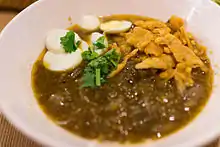 Mohinga with fritters | |
| Alternative names | Mont hin gar |
|---|---|
| Course | Breakfast |
| Place of origin | Myanmar |
| Associated national cuisine | Burmese cuisine |
| Main ingredients | Rice vermicelli, catfish |
| Ingredients generally used | Fish sauce, fish paste, ginger, banana stem, lemongrass, onions, garlic, chickpea flour |
| Variations | Many; see §Regional varieties below |
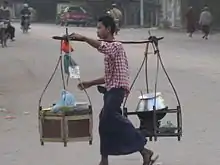
History and origins
The origins of mohinga are difficult to pinpoint in the absence of extant records.[2] Food processing tools dating to the Pyu city-states used to ferment rice have been discovered, leading to the conclusion that the tradition of making rice vermicelli, the key starch used in mohinga, has a long history. The earliest reference to mohinga dates to the Konbaung dynasty, in the poet U Ponnya's alinga verse poem.[2] Burmese history historian Khin Maung Nyunt has concluded that during pre-colonial times, mohinga was likely a commoner's dish, as a recipe for "mohinga" has not been found in palatial records and cookbooks.[2]
During the latter half of Bagyidaw's reign, a poet by the name of U Min emerged and referenced "mohinga" as "mont di" (မုန့်တီ) in a poetry competition. While mont ti now refers to another set of rice vermicelli dishes in modern-day Myanmar, a small minority continue uses "mont ti" in reference to mohinga. Various regions in the country also simply call mohinga "mont" (မုန့်) or "mont hin" (မုန့်ဟင်း).
Preparation
The main ingredients of mohinga are chickpea flour and/or crushed toasted rice, garlic, shallots, onions, lemongrass, banana tree stems, ginger, fish paste, fish sauce, and catfish or other types of fishes, like Mrigal carp in a rich broth cooked and kept on the boil in a cauldron.[3] It is served with rice vermicelli, dressed and garnished with fish sauce, a squeeze of lime, crisp fried onions, coriander, spring onions, crushed dried chillis, and, as optional toppings, deep-fried Burmese fritters such as split chickpeas (ပဲကြော်, pè gyaw),[4] urad dal (ဗယာကြော်, baya gyaw) or gourd (ဘူးသီးကြော်, bu thee gyaw) or sliced pieces of Chinese donuts (အီကြာကွေး), as well as boiled egg and fried nga hpè fish cake (ငါးဖယ်ကြော်).
Regional varieties
There are different regional varieties of mohinga throughout Myanmar, depending on the availability of ingredients and culinary preferences. For instance, Rakhine mohinga has more fish paste and less soup. The standard version comes from Lower Myanmar, where fresh fish is more readily available. The most popular varieties of mohinga come from the Irrawaddy Delta, which are commonly dubbed tawchet mohinga (lit. 'rural style mohinga').[5] Several well-known mohinga shops in Yangon serve Irrawaddy delta-style mohinga, including Myaungmya Daw Cho and Bogalay Daw Nyo.[6]
- Irrawaddy delta
- Bogale mohinga - cooked in a broth of fish and abundant black pepper[6]
- Myaungmya mohinga - cooked with three varieties of fish, namely striped snakehead (ငါးရံ့), walking catfish (ငါးခူ), and Hamilton's carp (ငါးကြင်းဖြူ)[7][6]
- Pyapon mohinga[8]
- Pathein mohinga[8]
- Yangon mohinga - cooked in a broth of catfish, chickpeas, and peanuts[9]
- Bago Region
- Hinthada mohinga - cooked with hilsa (ngathalauk) in lieu of catfish[10]
- Madauk mohinga - cooked with pickled shrimp, and served with raw tomatoes[11]
- Nyaunglebin and Pyuntaza mohinga - cooked with pickled fish, served with jujube pickles[12]
- Taungoo mohinga - served in a thinner broth more akin to a dry noodle salad, with raw tomatoes, chopped green beans, and a side of pickled white jujubes[12][13]
- Southern and Eastern Myanmar
- Dawei mohinga - similar to conventional mohinga, with black pepper in lieu of paprika[14]
- Kayin mohinga - served in one of two broths (sweet or spicy), served with raw tomatoes, bean sprouts, green beans, and mint in lieu of coriander[15][16]
- Mawlamyine mohinga - cooked to a thinner broth consistency with boiled peas, green beans, mint, fish cakes, and jaggery[17][18]
- Mon mohinga - similar to conventional mohinga, cooked without banana stems and rice flour[14]
- Thaton mohinga - served with Hamilton's carp, mint, green beans, bean sprouts, tomatoes, and fermented yellow rice cake patties (called သထုံထမင်းဝါ)[19]
- Upper Myanmar
- Anya mohinga - mohinga cooked in a broth of chicken, fish, and chickpea flour in lieu of toasted rice flour, common to Upper Myanmar towns like Monywa, Wetlet, Shwebo, Kyaukpadaung, and Myingyan[20]
- In mohinga - cooked in a broth of catfish and green onions[21]
Availability
It is perhaps the most popular breakfast dish of all, now available as an "all-day breakfast" in many towns and cities. Mohinga is also served with all the trimmings at formal functions and it is also sold in dry packets as a ready-made powder that is used for making the broth. Street hawkers are the original purveyors of this popular dish doing the rounds through neighborhoods where they have regular customers.[4] They carry the soup cauldron on a stove on one side of a shoulder pole and rice vermicelli and other ingredients along with bowls and spoons on the other.[4] It used to be available only early in the morning and at street pwès or open air stage performances and zat pwès or itinerant theatres at night. Trishaw peddlers began to appear in the 1960s and some of them set up pavement stalls making mohinga available all day.
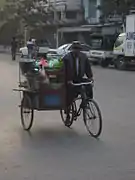 A mohinga trishaw peddler in Mandalay will stop for customers.
A mohinga trishaw peddler in Mandalay will stop for customers.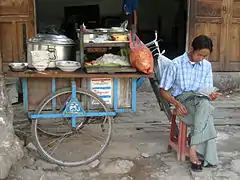 Mohinga is available all day from pavement stalls such as this in Mandalay.
Mohinga is available all day from pavement stalls such as this in Mandalay.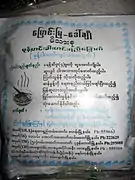 Ready-made packages containing powder to cook mohinga soup is also available.
Ready-made packages containing powder to cook mohinga soup is also available.
See also
References
- "Burmese Food Primer: Essential Dishes To Eat In Myanmar". Food Republic. 2017-02-22. Retrieved 2018-07-09.
- "မုန့်ဟင်းခါး အကြောင်း သိကောင်းစရာ". MyFood Myanmar (in Burmese). 2016-04-05. Retrieved 2021-01-09.
- Bush, Austin. "10 foods to try in Myanmar -- from tea leaf salad to Shan-style rice". CNN. Retrieved 2020-05-31.
- "Mohinga: Myanmar's National Dish". The Slow Road Travel Blog. 2013-08-27. Retrieved 2018-07-09.
- Thinn Thiri San (2019-07-24). "မုန့်ဟင်းခါး နှင့် မြန်မာလူမျိုး". Yangon Style (in Burmese). Retrieved 2021-01-09.
- ငြိမ်းအိအိထွေး (2018-08-29). "ရန်ကုန်မြို့က နာမည်ကျော် မုန့်ဟင်းခါးဆိုင် ၁ဝ ဆိုင်". The Myanmar Times. Retrieved 2021-01-09.
- "မြောင်းမြမုန့်ဟင်းခါး". MyFood Myanmar (in Burmese). 2015-12-13. Retrieved 2021-01-09.
- "ဒေသအစားအစာ တစ်ခုဖြစ်သည့် တောင်ငူမုန့်ဟင်းခါး". TimeAyeyar (in Burmese). 2018-08-13. Retrieved 2021-01-09.
- "ရန်ကုန် မုန့်ဟင်းခါး". MyFood Myanmar (in Burmese). 2015-12-29. Retrieved 2021-01-09.
- San San Oo (2017-07-25). "ဟင်္သာတမုန့်ဟင်းခါး". FOOD Magazine Myanmar (in Burmese). Archived from the original on 2018-10-08.
- "မဒေါက် မုန့်ဟင်းခါး". MyFood Myanmar (in Burmese). 2016-04-05. Retrieved 2021-01-09.
- လှမြိုင် (2019-08-06). "မုန့်ဟင်းခါး ဋီကာ (ဒါဖတ်ပြီးမှ မုန့်ဟင်းခါး စားပါ)". Lwin Pyin News (in Burmese). Retrieved 2021-01-09.
- "တောင်ငူ မုန့်ဟင်းခါး ရေကျဲ". MyFood Myanmar (in Burmese). 2016-03-08. Retrieved 2021-01-09.
- "မုန့်ဟင်းခါးချက်နည်းအမျိုးမျိုး". Yangon Life (in Burmese). 2019-02-01. Retrieved 2021-01-09.
- မြင့်ဦးသာ (2017-07-25). "ကရင်မုန့်ဟင်းခါး၊ ကရင်ငါးပေါင်းထုပ်၊ ဘားအံ၊ ကရင်ပြည်နယ်ခရီးစဉ်". FOOD Magazine Myanmar (in Burmese). Archived from the original on 2020-11-18.
- "ကရင် မုန့်ဟင်းခါး". MyFood Myanmar (in Burmese). 2016-06-02. Retrieved 2021-01-09.
- ချိုဝတ်ရည် (2013-04-13). "မော်လမြိုင် မုန့်ဟင်းခါး". Wutyee Food House (in Burmese). Retrieved 2021-01-09.
- "မော်လမြိုင် မုန့်ဟင်းခါး (သို့) မော်လမြိုင် မုန့်တီ". MyFood Myanmar (in Burmese). 2016-04-06. Retrieved 2021-01-09.
- "သထုံ ထမင်းဝါ (မုန့်ဟင်းခါး)". MyFood Myanmar (in Burmese). 2016-06-03. Retrieved 2021-01-09.
- "ညောင်ပင်ကြီး မုန့်ဟင်းခါး (သို့) အညာ မုန့်ဟင်းခါး". MyFood Myanmar. 2016-04-04. Retrieved 2021-01-09.
- "အင်းမုန့်ဟင်းခါး (သို့) အင်းမုန့်တီ". MyFood Myanmar (in Burmese). 2016-04-04. Retrieved 2021-01-09.
External links
- Mohinga article Archived January 5, 2010, at the Wayback Machine
.jpg.webp)